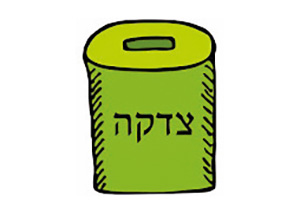
How to give so that everyone truly benefits.
With the holidays of Purim and Pesach fast approaching, we are often asked to give tzedaka during this time.
What makes a nonprofit worthy of your donations? How do you know if they are efficient and effective?
The goal of these questions is to help you to better perform the mitzvah of giving tzedaka so more of your precious, hard-earned, and holy tzedaka money will go to what you want to fund. Sounds easy enough, right?
Whether giving online with just a few clicks of the mouse, giving your credit card number to someone over the phone, or writing a check and mailing it, giving tzedaka is pretty simple and quite effortless. But giving wisely is not so simple.
Jews give tzedaka because it is a mitzvah—a commandment to give. The Rambam (Maimonides, 11th century) writes in his introduction to the laws of tzedaka (Gifts to Poor People 10:1), “We must be especially careful to observe the mitzvah of tzedakah, more so than any other positive mitzvah.” Let me repeat that last part: “more so than any other positive mitzvah.” According to the Rambam, you need to be more careful about giving tzedaka than other positive mitzvahs, such as loving God, observing Yom Kippur, sanctifying the Shabbat, putting on tefillin, affixing a mezuzah, eating matzah, hearing the shofar, honoring parents, being fruitful and multiplying, and so on.
The Rambam—a physician, philosopher, astronomer, and one of the greatest rabbinic minds in our history—understood that people would be more likely to be extremely scrupulous about the matzah they eat or about their Shabbat observance than to give tzedakah properly, so he made a point to clarify where the priority ought to be.
In addition, the great rabbinic mind of our previous generation, Rav Joseph B. Soloveitchik felt that the mitzvah of giving tzedaka is one of only two mitzvot where being “machmeer” (more strict than necessary) is “highly advisable.” (“Seventy Conversations in Transit,” Rabbi Aaron Adler, OU Press, Urim Publishers, 2021, p.157.)
I once read a quote by BZ (who only identified himself by his initials): “How much better would the Jewish world be if we could apply the same obsessive-compulsiveness to tzedaka that we do to cleaning for Pesach?” Indeed, too often, we can be very poor tzedaka givers.
One thing we must understand: tzedaka money doesn’t actually belong to us; it always belongs to the recipient. We are only the trustees, holding the funds in trust until distributed. We are trusted to give tzedaka in the most efficient and effective manner possible. Otherwise, we are misusing tzedaka funds which belong to someone else.
My “tzedaka rebbe,” Danny Siegel, taught me from Mishlei (Proverbs 22:22): “Al Tigzol Dal, Kee Dal Hu—Do not steal from a poor person, because he is poor.” The rabbis come along and ask a very appropriate question: “What can this possibly mean? If one is poor, what is there to steal?” (Numbers Rabba 5:2)
They answer, explaining that poor people have God-given rights: the right to the benefits from certain Torah mitzvot like the gleaning of the fields and other tzedaka-related commandments. If we don’t provide what we are obligated to give to the poor person, we are, in essence, stealing from them. The rabbis ask “isn’t it enough that they are poor and live in misery while the rich are living comfortably, but you would also dare steal from them what God has given to them?”
Most of us give to community tzedaka funds or nonprofit organizations. Unfortunately, many have high overhead—25%, 35% and some, with even more than 50%—meaning that half of your contribution goes to things other than what you really thought or wanted.
For example, you want to support feeding people in need. Nonprofit “X” spends 28% of every dollar you contribute on overhead, so only 72% actually goes to feeding people in need. If you had a choice between supporting “X” or a different organization such as “Y,” with overhead of only 14% (assuming that, for the most part, they were relatively equivalent), which one would you choose? And if the organization is in Israel, add to that the expenses incurred by the “American Friends of,” some of which are not very efficient themselves, and your effective tzedaka monies continue to dwindle to where perhaps only 60% of your original contribution will actually feed hungry people.
In addition to general overhead, it is always important to check the overhead salaries (not the program salaries) of nonprofit organizations. Why give to the pocket of someone who is earning significant sums of money—many nonprofit CEOs and executive staff earn many multi-hundreds of thousands of dollars annually. Obviously they deserve to be paid for the difficult job they do, but it should be within reason, not at the expense of helping the very people you want your tzedaka funds to help.
So what can you do?
To begin with, ask every organization you give to (or want to give to) whether big or small, to send you a copy of last year’s audited financial report. In addition, in both the U.S. and in Israel, nonprofits are required to annually submit documents for public scrutiny. These can be found online at websites like guidestar.org; irs.gov/charities-non-profits/tax-exempt-organization-search; or in Israel at guidestar.org.il.
Also ask for a copy of the current year’s operational budget and review it carefully. This is exactly what the Rambam was referring to when he wrote about being more scrupulous in our tzedaka giving than we are in other mitzvot.
Rambam also discusses how to give, and he says clearly that the tzedaka fund or organization you are giving to must be led by people who have impeccable credentials, are wise and prudent, and really know how to run a tzedaka organization.
So, is it really a crime to give improperly? Judaism is clear about not giving properly: it is as if you are stealing from the poor people themselves, since “your” tzedaka money is really theirs.
Arnie Draiman is a philanthropic consultant helping people and foundations give their tzedaka money away wisely, efficiently and effectively for over 25 years. In addition, he consults to hi-tech start-ups and is an expert in social media marketing and promotion. He can be reached at [email protected].













